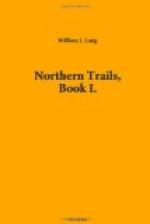Whether or not the father wolf ever knew where his cubs were hidden only he himself could tell. He was an enormous brute, powerful and cunning beyond measure, that haunted the lonely thickets and ponds bordering the great caribou barrens over the ridge, and that kept a silent watch, within howling distance, over the den which he never saw. Sometimes the mother wolf met him on her wanderings and they hunted together. Often he brought the game he had caught, a fox or a young goose; and sometimes when she had hunted in vain he met her, as if he had understood her need from a distance, and led her to where he had buried two or three of the rabbits that swarmed in the thickets. But spite of the attention and the indifferent watch which he kept, he never ventured near the den, which he could have found easily enough by following the mother’s track. The old she-wolf would have flown at his throat like a fury had he showed his head over the top of the ridge.
The reason for this was simple enough to the savage old mother, though there are some things about it that men do not yet understand. Wolves, like cats and foxes, and indeed like most wild male animals, have an atrocious way of killing their own young when they find them unprotected; so the mother animal searches out a den by herself and rarely allows the male to come near it. Spite of this beastly habit it must be said honestly of the old he-wolf that he shows a marvelous gentleness towards his mate. He runs at the slightest show of teeth from a mother wolf half his size, and will stand meekly a snap of the jaws or a cruel gash of the terrible fangs in his flank without defending himself. Even our hounds seem to have inherited something of this primitive wolf trait, for there are seasons when, unless urged on by men, they will not trouble a mother wolf or fox. Many times, in the early spring, when foxes are mating, and again later when they are heavy with young and incapable of a hard run, I have caught my hounds trotting meekly after a mother fox, sniffing her trail indifferently and sitting down with heads turned aside when she stops for a moment to watch and yap at them disdainfully. And when you call them they come shamefaced; though in winter-time, when running the same fox to death, they pay no more heed to your call than to the crows clamoring over them. But we must return to Wayeeses, sitting over her den on a great gray rock, trying every breeze, searching every movement, harking to every chirp and rustle before bringing her cubs out into the world.
Satisfied at last with her silent investigation she turned her head towards the den. There was no sound, only one of those silent, unknown communications that pass between animals. Instantly there was a scratching, scurrying, whining, and three cubs tumbled out of the dark hole in the rocks, with fuzzy yellow fur and bright eyes and sharp ears and noses, like collies, all blinking and wondering and suddenly silent at the big bright world which they had never seen before, so different from the dark den under the rocks.




